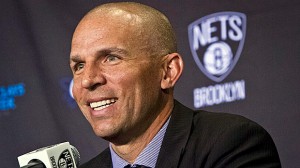What is Coach Education?
A common coach education/training/certification program is a series of classes (in person or online) taking a new coach through a progression of topics like the basics of coaching theory and safety issues, to more advanced coaching and sport-specific concepts. Recently, the NBA’s Brooklyn Nets hiring of just-retired Jason Kidd as head coach with no coaching experience (but a Hall-of-Fame playing career) raised the question for many of whether he is qualified, and how do coaches learn to coach? Personally, I thought I knew a lot about football since I had been a lifelong fan and had played for a successful high school program, but when I got a job as an assistant high school football coach right out of college I quickly found that, for me, there was a huge difference between playing and coaching (and even coaching on computer games!).
Not surprisingly, there is no sure-fire system for all coaches in all sports at all levels.
In 2007 François Lemyre, Pierre Trudel, and Natalie Durand-Bush wrote an article looking at coach education. They found four things:
(a) formal programs are only one of the many opportunities to learn how to coach;
(b) coaches’ prior experiences as players, assistant coaches, or instructors provide them with some sport-specific knowledge and allow them to initiate socialization within the subculture of their respective sports;
(c) coaches rarely interact with rival coaches; and
(d) there are differences in coaches’ learning situations between sports (p. 191)
Why does coach education matter?
I believe that coaches help fill a crucial role in society and can have long-lasting effects on their players- both good and bad. Coach education does not have to result in a certificate or title- we all can help improve that state of coaching with intentional effort.
One problem is that “there is a tendency to see the results of studies on elite coaches as the best coaching practice and, therefore, apply them to all coaches, including youth-sport coaches” (Lemyre, Trudel, and Durand-Bush, 2007, p. 192). However, every level has different challenges and not every coach should coach the same!
Veteran coaches (at every level)- give back by helping our new coaches. As the article stated, informal interactions with coaches are vital to a coach’s development.
How can I improve my coach education?
- Understand that there are difference in sport and level. There is no one-size-fits-all approach to coaching!
- Actively seek ideas from coaches at your level. You’d be surprised how many people will help if you ask them in person.
- Take in ideas with a critical mind- don’t just do something because a famous coach does it! Be sure to evaluate if it is right for your situation.
- Focus on learning and being able to teach the fundamentals of your sport. Many want to move on to advanced techniques or tactics, but a firm grasp of the fundamentals is good for players at every level.
- Realize that you are not in this alone! There are many coaches in the exact same situation as you. Finding those coaches (whether online or in person) can be a great way to relieve stress.
That’s what I think. What do you think? Let me know with a comment, tweet, or email.
Coach ’em up!
About the Author: After coaching and working with various teams at the college, high school, and youth level in a variety of roles for 18 years, I have returned to finish my Ph.D. in Kinesiology & Sport Studies. I have also been involved in athletics as a player, coach, administrator, official, and parent.
PS- If you are interested in the full article here is the full reference:
Lemyre, F., Trudel, P., & Durand-Bush, N. (2007). How youth-sport coaches learn to coach. Sport psychologist, 21(2), 191.
